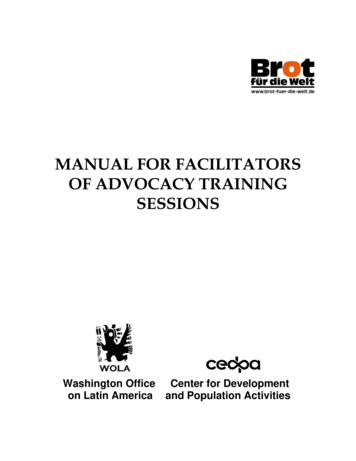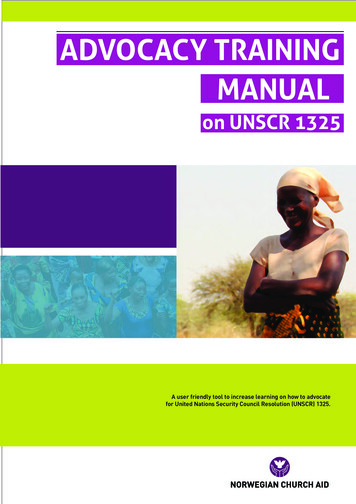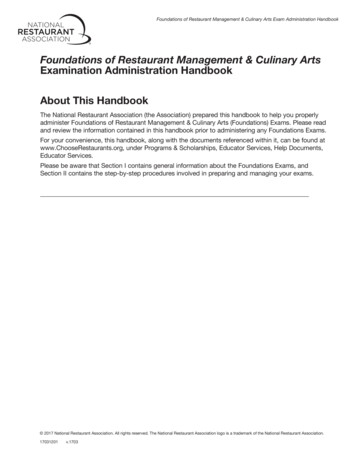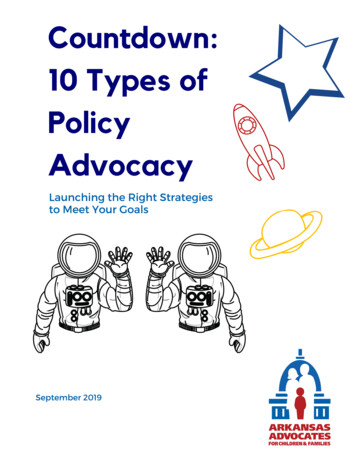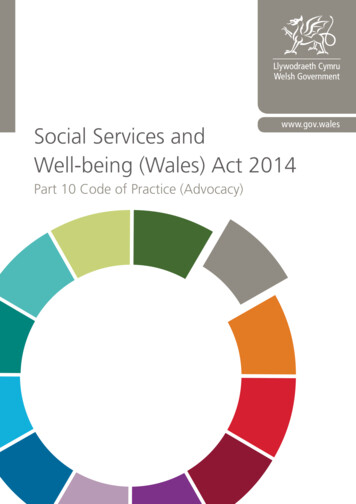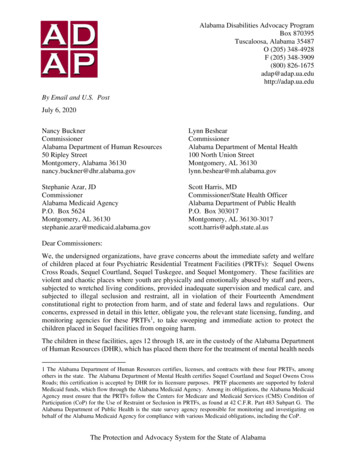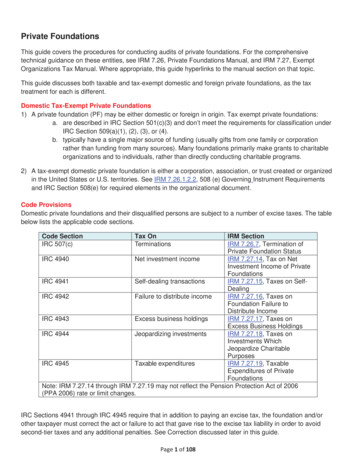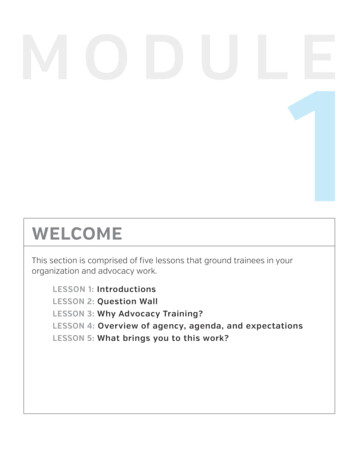
Transcription
MODULE 1WELCOMEThis section is comprised of five lessons that ground trainees in yourorganization and advocacy work.LESSON 1: IntroductionsLESSON 2: Question WallLESSON 3: Why Advocacy Training?LESSON 4: O verview of agency, agenda, and expectationsLESSON 5: What brings you to this work?
MODULE 1: WELCOMEOBJECTIVESTrainees will be able to: Describe the training agenda and expectations Meet the trainers, key agency staff, and other trainees Describe the agency mission, vision, and services and policies thatsupport the work Articulate what grounds them in this work Begin to identify how their interests pair with the goals of the training and theadvocacy programMATERIALS Training agenda (if you choose to create one) Agency brochures Flipchart paper or dry erase board Markers Notecards Pens/pencilsTIPS FOR PREPARATION Ask in advance that someone in your organization’s leadership (ExecutiveDirector, a Board Member, etc.) come in to join the welcome for this cohort oftrainees. Check in to see if they need any help in preparing welcoming wordsfor the cohort. Plan your own introduction so that you can model the activity to trainees. State/territory laws related to confidentiality and privileged communicationfor advocates vary among the states, territories, and tribes. These lawsinform advocacy practices. Gather information prior to the training about yourstate/territory/tribe’s laws related to privileged communication for advocates.FOUNDATIONS OF ADVOCACY TRAINING MANUAL36
MODULE 1: WELCOMEPOINTS TO CONSIDER Set an open and welcoming toneMany trainees will come to this first session with a variety of expectations aswell as concerns or fears: about the topic of sexual violence, about how theywill be received, and about advocacy. You can start demonstrating that this isa safe and welcoming space by maintaining a welcoming, friendly, open, anddirect demeanor. Be upfront about the potential impact of the trainingThis first session will give you, as the trainer, the opportunity to reinforceany messages that were shared in the application/interview process. Forexample, the training is a good way for the trainee to find out if this advocacyrole feels like a good fit. It is expected that some will find the role of anadvocate not what they anticipated it to be or perhaps too difficult. For some,the training can be upsetting or triggering, for a variety of reasons. Youshould remain alert to the potential of this occurring and include discussionof this during the application and interview processes. Stay grounded in trainees’ passions for the workAs the training sessions continue and when you are able, try to rememberto refer back to an individual trainee’s motivation or passion for this work toreinforce how their contributions bring value to the overall. Supporting trainees who disclose or want supportDuring training, trainees may feel moved to disclose their own history ofbeing a survivor or a significant other of someone who has experiencedsexual violence. Acknowledge that there are survivors in the room who mayor may not choose to disclose their experience. Encourage trainees to takecare of themselves the best way they can throughout the training, such asstepping out at any time if they are triggered or uncomfortable and engagingwith supports. Set up multiple options for trainees to debrief and talk withstaff as needed. Continue to be aware of this possibility and make sure youhave staffing, policy, and supervision supports available to all trainees.FOUNDATIONS OF ADVOCACY TRAINING MANUAL37
MODULE 1: WELCOMELESSON 1: INTRODUCTIONSThis is a brief introduction activity, with an upcoming module that focuses more ontrainees’ interest in advocacy. For the activity in this section, ask trainees to prepareresponses to questions a–d, plus two additional questions of their choice from thoselisted. Write the questions on a flipchart, dry erase board, or prepare PowerPoint slides.Use these four prompts (a–d):a. What is your name?b. What are your gender pronouns? (i.e., how do you refer to your own gender? he,she, they, etc.)c. What do you want to learn about sexual violence?d. What do you want to learn about advocacy?And select two prompts from the list below:e. What do you like to do for fun or relaxation?f. Where were you born and where did you grow up?g. Share something about the origin of your name/nickname.h. What languages do you speak?i. What is the furthest you have ever been from where you live?j. What is your favorite food?k. What is one hope you have for the future?FOUNDATIONS OF ADVOCACY TRAINING MANUAL38
MODULE 1: WELCOMEACTIVITY INSTRUCTIONS Briefly introduce yourself by answering to the questions selected to modelthe activity. Ask your co-trainer/s to do the same. As trainees introduce themselves to the group, write any themes on theflipchart or dry erase board. Make notes to yourself on any significant points or questions to return to. Thank participants for choosing to learn more about sexual violence andadvocacy. For some, this may be the first time they have thought deeply andcritically about the issue of sexual violence. Explain that in any group, one can find great diversity in interests, values,professions, and life experiences as the introductions might indicate. Whetheryou know someone well or are meeting that person for the first time, thereis always something interesting and new to learn about that person. Thereis a wealth of information and experience represented in the entire groupand it can be an invaluable resource throughout and after the training. Whiledifferences are interesting and important to acknowledge, similarities are alsoimportant. For example, there should be a shared commitment to assistingsurvivors of sexual violence.FOUNDATIONS OF ADVOCACY TRAINING MANUAL39
MODULE 1: WELCOMELESSON 2: QUESTION WALLIntroduce the concept and practice of a “Question Wall.” Have a piece of flipchart paperposted on a side wall with markers available. The Question Wall is a process of collectingquestions or concerns that are prompted by the topics discussed.It is important to eventually refer back to this sheet and make sure that questions areanswered — either immediately, or after the trainers have found answers or resources.These questions can help identify future needs for trainings. Remember if one personhas the courage to ask then most likely, there are others in the room that have thesame questions.Let trainees know:If there is something they want to know more about, they can add a question orcomment to this sheet. Of course, this does not take the place of asking questions duringdiscussions. The question posted may be about a previous training topic, somethingthat may be a tangent to what is being discussed in the moment, something a trainee iscurious about, or something they anticipate may come up in future discussions but theywant to make sure isn’t missed.FOUNDATIONS OF ADVOCACY TRAINING MANUAL40
MODULE 1: WELCOMELESSON 3: WHY ADVOCACY TRAINING?Advocates are powerful people. Being present, listening, and validating are some of themost helpful skills advocates have that survivors are not likely to get elsewhere.When discussing the importance of advocacy training, integrate these points intoyour dialogue: Advocates are an important resource for survivors. Advocates provide a safe placefor a survivor along their process of healing. Advocates believe the survivor andfollow the direction given to us by the survivor. Advocates know that survivors arewhole, healthy, capable human beings responding to trauma. Advocacy training helps advocates build the ability to support survivors throughtheir knowledge of resources and development of active listening skills. Legal standing is often connected with the successful completion of the training.This enables survivors’ communication with advocates to be privileged, meaningthat what is communicated between survivors and advocates cannot be requiredto be disclosed by law except in rare circumstances. In some states, advocatescan claim privileged communication status with survivors only when they havebeen trained and are employed with or volunteer at agency. Privileged statuslikely does not apply outside their advocate role. For example, trained advocatescould not provide advocacy to a friend outside of the agency context andmaintain privileged status. With awareness of your state’s laws, explain thissignificance to trainees.FOUNDATIONS OF ADVOCACY TRAINING MANUAL41
MODULE 1: WELCOMETrainees may find it helpful if you acknowledge: Some trainees may be curious or even anxious at the thought of working withsurvivors of sexual violence — that is exactly why this training is provided. Thetraining will begin to prepare participants with the skills and knowledge they needto start this work. Remind participants that they are not alone in this work; there isthe entire advocacy program with multiple perspectives and talents behind them.Supporting survivors and working toward ultimately ending sexual violence takescollective community action. The foundational advocacy training is just the beginning of the learning processabout sexual violence and advocacy. This is a time for challenging oneself,engaging in curiosity about this complex issue, and making a commitmentto continually learn. Trainees will continue to learn from other trainers, fromfellow advocates, and from watching public commentary about sexualviolence. Most importantly, trainees will learn from the survivors they have theopportunity to work with.FOUNDATIONS OF ADVOCACY TRAINING MANUAL42
MODULE 1: WELCOMELESSON 4: OVERVIEW OF AGENCY, AGENDA,AND REQUIREMENTSThis is an opportunity to review the logistical aspects of the training for trainees. This isalso a chance for trainees to check in about logistical questions they may have.Trainers may consider covering: Dates, times, and locations of training Expectations regarding make-up sessions or what to do if a trainee can’tmake a training Information about training modalities used (for example, lecture, discussion, smallgroup activities, field trips, speakers, and online activities, as applicable) An overview of when/how there will be opportunities to debrief and what a traineeshould do if they need additional time to debrief Agency commitment to organizational support for staff/trainee wellness andrelated information on available support How feedback will be gathered A brief agency overview including information about programs, the mission, andvision. Consider sharing brochures/handouts that cover: Programs and services available Agency mission and vision statements Agency values Other items that represent your agency Housekeeping items such as: How to reach the trainers between sessions Accessible restroom locations Service animal relief area (if applicable) Where to find water or refreshmentsFOUNDATIONS OF ADVOCACY TRAINING MANUAL43
MODULE 1: WELCOMELESSON 5: WHAT BRINGS YOU TO THIS WORK?This activity and discussion will invite trainees to share about what brings them to thiswork. Hand out notecards and direct trainees to write down a response to the prompt,“What inspired you to want to be an advocate?” Invite trainees to share with the group.There are many thoughtful ways to listen to and honor trainees’ responses. It isimportant to show appreciation for whatever the motivating factors are that bring atrainee to this work. There is no ‘right’ motivation for doing this work.Examples include: Some people become advocates out of a passion for the cause. Some become advocates as a means of fulfilling the need foremployment or education. Some people become advocates out of lived experience and a desire to smooththe path for someone else. Some people want to find a way to give back to individuals and community.FOUNDATIONS OF ADVOCACY TRAINING MANUAL44
FOUNDATIONS OF ADVOCACY TRAINING MANUAL45
FOUNDATIONS OF ADVOCACY TRAINING MANUAL 43 LESSON 4: OVERVIEW OF AGENCY, AGENDA, AND REQUIREMENTS This is an opportunity to review the logistical aspects of the training for trainees . This is also a chance for trainees to check in about logistical questions they may have . Trainers may consider covering: Dates, times, and locations of training
